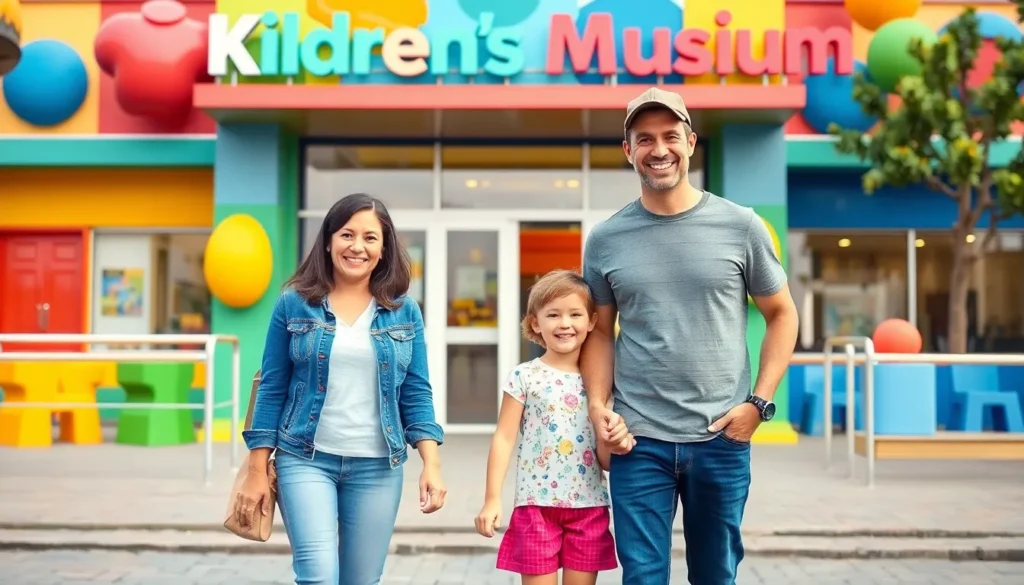In a world where kids juggle school, friendships, and the occasional TikTok dance challenge, mental health often takes a backseat. Enter mental health apps—those digital superheroes swooping in to save the day! These apps aren’t just for adults; they’re tailored for kids, making emotional well-being fun and engaging.
Table of Contents
ToggleOverview of Mental Health Apps for Kids
Mental health apps for kids promote emotional well-being through engaging and interactive platforms. These applications cater to various age groups, offering content tailored to their developmental stages. Many apps focus on mindfulness techniques, providing children with tools to manage anxiety and stress. Gamification plays a significant role, making learning about emotions enjoyable and motivating.
Numerous mental health apps include features for guided breathing exercises, meditation practices, and mood-tracking tools. Kids learn to express feelings and manage emotions effectively through playful activities and relatable stories. Specific apps encourage journaling, allowing children to articulate thoughts and experiences in a safe environment.
Research highlights the positive impact of these apps on children’s mental health. Kids utilizing mental health apps demonstrate improved emotional regulation and coping strategies. Regular use can create a supportive routine, fostering resilience and self-awareness. Parents and caregivers also benefit from these tools, gaining insights into their children’s emotional states.
While a variety of options exist, caregivers must consider age-appropriateness and content quality. Selecting reliable apps that prioritize evidence-based practices enhances their effectiveness. Monitoring the child’s experience ensures that the app aligns with their needs and preferences. By incorporating mental health apps, children gain access to valuable resources that support their emotional growth.
Importance of Mental Health in Childhood

Mental health significantly influences childhood development, shaping children’s emotional and social skills. Strong mental health allows kids to navigate daily challenges, impacts learning, and fosters positive relationships.
Common Mental Health Issues in Children
Anxiety disorders affect approximately 20% of children, leading to excessive worry and fear. Depression is another prevalent issue, with studies showing that about 3% of children experience symptoms. Attention-deficit/hyperactivity disorder (ADHD) impacts around 5% of children, affecting focus and impulse control. Behavioral problems often arise, with settings like schools recognizing the need for early intervention. Early identification of these concerns helps children receive necessary support, allowing them to thrive despite these challenges.
The Role of Technology in Mental Health Support
Technology provides innovative solutions for supporting children’s mental health. Mental health apps specifically designed for kids offer engaging and accessible resources. Many apps include features like mood tracking and guided breathing, helping kids learn emotional regulation. These tools promote coping strategies through interactive activities. Research indicates that children using these apps demonstrate improved emotional awareness and resilience. Parents can monitor progress and gain insights into their child’s feelings through these platforms, enhancing communication and support.
Features of Effective Mental Health Apps for Kids
Effective mental health apps for kids incorporate several key features that enhance their usability and impact.
User-Friendly Interface
A user-friendly interface allows children to navigate the app with ease. Simple design elements, large buttons, and clear instructions enhance accessibility. Bright colors and playful graphics capture children’s attention, making the experience enjoyable. Interactive elements promote exploration, encouraging kids to return often. Additionally, intuitive layouts help reduce frustration for both kids and parents.
Engaging Content and Activities
Engaging content and activities keep children motivated to use mental health apps. Incorporating games, stories, and art activities fosters creativity. These interactive components allow children to express feelings while learning coping strategies. Mindfulness exercises and guided meditations effectively teach emotional regulation. Age-appropriate challenges and rewards further stimulate interest, ensuring kids find value in their mental health journey.
Popular Mental Health Apps for Kids
Several mental health apps cater to children’s emotional well-being, each offering unique features. These tools help kids develop coping strategies while ensuring an engaging experience.
App 1: Overview and Key Features
Headspace for Kids provides mindfulness exercises specifically designed for young users. Engaging animations and guided meditations encourage children to explore their feelings. Age-appropriate sessions last between 3 to 15 minutes, promoting relaxation and focus. Daily check-ins help monitor mood changes, empowering kids to express their emotions actively. The app’s playful approach keeps children interested while fostering emotional resilience.
App 2: Overview and Key Features
Breathe, Think, Do with Sesame equips kids with problem-solving strategies through interactive games. Utilizing beloved characters, the app teaches deep breathing and self-regulation techniques. Each activity targets specific emotional challenges, such as frustration and anxiety. Content is engaging, inviting kids to practice coping skills in fun scenarios. Overall, this app encourages positive mental health habits while providing essential support for children.
App 3: Overview and Key Features
Moodnotes focuses on mood tracking and cognitive behavioral techniques tailored for kids. Users can log their feelings daily and receive feedback on emotional patterns. Fun, colorful graphics make journaling appealing while fostering emotional awareness. Additionally, the app offers prompts for reframing negative thoughts into positive ones. By guiding children in understanding their emotions, Moodnotes cultivates a healthier mindset.
Benefits of Using Mental Health Apps for Kids
Mental health apps for kids offer significant advantages, especially in managing emotional well-being and facilitating communication. They provide immediate access to resources and coping strategies right from a smartphone or tablet.
Accessibility and Convenience
Accessing mental health apps enhances convenience for children and their caregivers. Users can engage with content anytime and anywhere, making it easier to practice mindfulness and emotional management. These apps often include features like reminders, which help kids consistently integrate mental health techniques into their daily routines. Many apps cater specifically to different age groups, ensuring age-appropriate interactions tailored to developmental stages. Thus, children can learn about their feelings and coping mechanisms in a playful and engaging manner, fostering positive habits over time.
Enhanced Communication with Professionals
Mental health apps improve communication between children and mental health professionals. Features within these apps often allow kids to share insights about their feelings directly with their therapists, enhancing the therapeutic process. Released data shows improved outcomes when kids share progress via mood tracking and journaling tools within the app. Sharing experiences fosters a stronger relationship with health professionals, promoting ongoing dialogue about emotional well-being. As therapists can quickly identify patterns and issues, they can adjust treatment plans to better meet each child’s needs.
Potential Drawbacks and Considerations
Despite the advantages of mental health apps for kids, several drawbacks and considerations exist. These aspects require careful evaluation by parents and caregivers.
Screen Time Concerns
Screen time tends to be a significant concern for many parents. Research indicates that excessive screen time can lead to negative impacts on children’s physical health and social skills. Mental health apps often add to the amount of time kids spend on devices, potentially decreasing face-to-face interactions. Limiting usage to specific periods is one strategy to address these concerns. It’s vital to balance app engagement with outdoor play and personal interactions. Kids’ mental health can benefit from varied activities beyond screens.
Parental Involvement
Parental involvement is crucial when using mental health apps. Parents should actively participate in discussions about app content and emotional experiences. Open communication fosters trust and understanding, allowing children to share their feelings effectively. Additionally, caregivers can provide guidance on implementing techniques learned through apps in daily life. Involvement can strengthen family bonds and promote healthy emotional development. Monitoring app usage ensures that children engage with age-appropriate content tailored to their needs.
Mental health apps for kids represent a significant advancement in supporting emotional well-being. By offering engaging and interactive platforms, these tools empower children to understand and manage their feelings effectively. They not only provide valuable resources but also foster communication between kids and caregivers, enhancing emotional support.
While it’s essential to consider age-appropriateness and content quality, the benefits of these apps are clear. With proper guidance and balanced usage, mental health apps can play a pivotal role in helping children navigate their emotional landscapes. As technology continues to evolve, these tools will likely become even more integral to promoting healthy mental habits in the younger generation.





